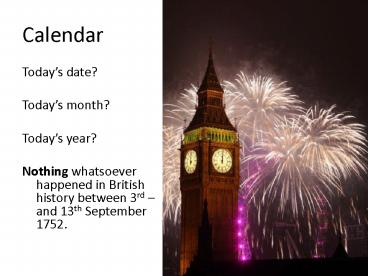Calendar - PowerPoint PPT Presentation
1 / 6
Title: Calendar
1
Calendar
- Todays date?
- Todays month?
- Todays year?
- Nothing whatsoever happened in British history
between 3rd and 13th September 1752.
2
11 lost days?
The Gregorian calendar is the one most used
nowadays. It is named after Pope Gregory Xlll who
introduced it in 1582. Up until 1753, the
calendar we used in Britain was the Julian
Calendar which was based on the solar year, the
time it takes for the Earth to rotate around the
Sun, and thus was less accurate than the
Gregorian Calendar. The Julian Calendar was
365.25 days long, which was fractionally too
long, and the calendar over time fell out of line
with the seasons.
3
All change - "Give us back our 11 days!
- "In 1752 Britain decided to correct this by
abandoning the Julian calendar in favour of the
Gregorian. - By doing so, 3 September instantly became 14
September - and as a result, nothing whatsoever
happened in British history between 3 and 13
September 1752. - Many people thought that the government had
stolen eleven days of their lives. They protested
in the streets, demanding "Give us back our 11
days!"
4
- Before the calendar was changed, England
celebrated Christmas on the equivalent of the 6th
of January by our modern, Gregorian reckoning. - That is why in some people still call the 6th
January, Old Christmas Day. - January is also known as Epiphany or Twelfth Day.
If you are Russian Orthodox or Orthodox from
some communities you may be celebrating Christmas
again this week!
5
Does it matter?
- We measure time because it is important and every
day is a gift. - As each day is a gift to us, a one-off
opportunity to make the most of each precious
minute given to us. - There are 30 school days in this 1st half Spring
Term what goals and targets will you set for
each day? How will you use your time wisely?
6
We must use time wisely and forever realize that
the time is always ripe to do right. Nelson
Mandela































